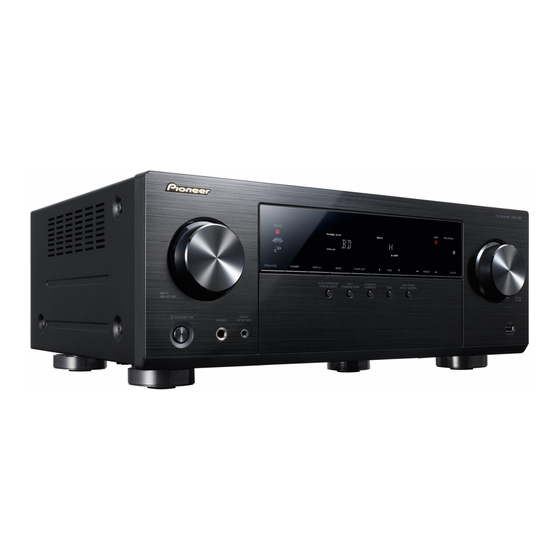Pioneer VSX-423-S Manual de instrucciones - Página 29
Navegue en línea o descargue pdf Manual de instrucciones para Receptor Pioneer VSX-423-S. Pioneer VSX-423-S 38 páginas. Owner's manual
También para Pioneer VSX-423-S: Manual de servicio (6 páginas), Manual de inicio rápido (46 páginas), Manual de servicio (6 páginas), Manual de inicio rápido (45 páginas)

5
5
Setting/What it does
DRC (Dynamic Range Control)
Adjusts the level of dynamic range for movie
soundtracks optimized for Dolby Digital, DTS,
Dolby Digital Plus, Dolby TrueHD, DTS-HD
and DTS-HD Master Audio (you may need to
use this feature when listening to surround
sound at low volumes).
LFE ATT (LFE Attenuate)
Some Dolby Digital and DTS audio sources
include ultra-low bass tones. Set the LFE
attenuator as necessary to prevent the ultra-
low bass tones from distorting the sound from
the speakers.
The LFE is not limited when set to 0 dB, which
is the recommended value. When set to –15
dB, the LFE is limited by the respective
degree. When OFF is selected, no sound is
output from the LFE channel.
f
SACD G. (SACD Gain)
Brings out detail in SACDs by maximizing the
dynamic range (during digital processing).
HDMI (HDMI Audio)
Specifies the routing of the HDMI audio signal
out of this receiver (AMP) or through to a TV
(THRU). When THRU is selected, no sound is
output from this receiver.
g
A.DLY (Auto Delay)
This feature automatically corrects the audio-
to-video delay between components
connected with an HDMI cable. The audio
delay time is set depending on the operational
status of the display connected with an HDMI
cable. The video delay time is automatically
adjusted according to the audio delay time.
C.WIDTH (Center Width)
h
(Applicable only when using a center speaker)
Spreads the center channel between the front
right and left speakers, making it sound wider
(higher settings) or narrower (lower settings).
Option(s)
Setting/What it does
e
DIMEN (Dimension)
AUTO
Adjusts the surround sound balance from
MAX
front to back, making the sound more distant
MID
(minus settings), or more forward (positive
settings).
OFF
h
PNRM. (Panorama)
Extends the front stereo image to include
0 (0 dB)
surround speakers for a 'wraparound' effect.
5 (–5 dB)
C.IMG (Center Image)
10 (–10 dB)
(Applicable only when using a center speaker)
15 (–15 dB)
Adjust the center image to create a wider
stereo effect with vocals. Adjust the effect
20 (–20 dB)
from 0 (all center channel sent to front right
** (OFF)
and left speakers) to 10 (center channel sent
to the center speaker only).
You can change the MIDNIGHT/LOUDNESS options at any
a.
time by using
MIDNIGHT
0 (0 dB)
You can change the Sound Retriever feature at any time by
b.
+6 (+6 dB)
using
S.RETRIEVER
The default setting when the iPod/USB input is selected is ON.
c.
This setting works only with dual mono encoded Dolby Digital
AMP
d.
and DTS soundtracks.
THRU
The initial set AUTO is only available for Dolby TrueHD signals.
e.
Select MAX or MID for signals other than Dolby TrueHD.
You shouldn't have any problems using this with most SACD
f.
discs, but if the sound distorts, it is best to switch the gain
OFF
setting back to 0 dB.
ON
This feature is only available when the connected display
g.
supports the automatic audio/video synchronizing capability
('lip-sync') for HDMI. If you find the automatically set delay time
unsuitable, set A.DLY to OFF and adjust the delay time
manually. For more details about the lip-sync feature of your
display, contact the manufacturer directly.
Only available with 2-channel sources in DOLBY PLII MUSIC
h.
0 to 7
mode.
Default: 3
Only when listening to 2-channel sources in NEO:6 CINEMA
i.
and NEO:6 MUSIC mode.
Option(s)
–3 to +3
h
Default: 0
OFF
ON
0 to 10
i
Default: 3
(NEO:6 MUSIC),
10 (NEO:6
CINEMA)
button.
button.
29
Listening to your system
4
6
34
